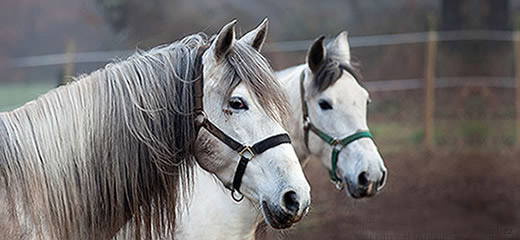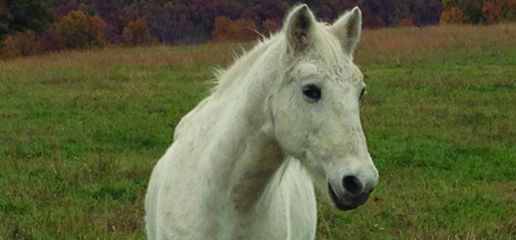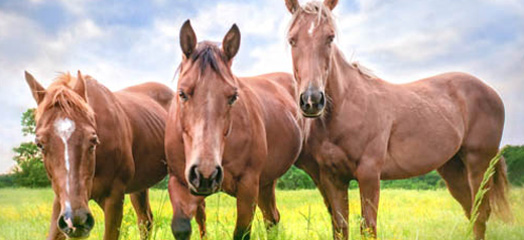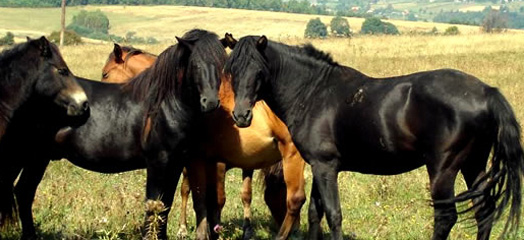Frequently Asked Questions
- What is an "equine"?
- Are there do's and don'ts if I want to help an equine?
- My neighbor says his skinny horse is fine. Can that be true?
- I'm not sure if the horse is starving or just old. What should I do?
- Why don’t our law enforcement agencies do something about animal neglect/abuse?
- Who do I contact if I would like to foster an equine?
- I am interested in volunteering. What do I need to do?
- Why do I need to become a member of Hope for Horses if I want to volunteer, foster or adopt an equine?
What is an "equine" ?
- An equine as we use the term refers to a variety of animals such as a horse, mule, donkey, or a horse/zebra.
Back to Top
Are there do's and don'ts if I want to help an equine?
- There are definitely do’s and don’ts when helping animals you think are in need. The following is a general list but is not all inclusive:
• DON’T go onto another person’s property. You can toss feed or hay over the fence or run a hose through a fence into a tub to provide water.
• DON’T feed large stem grass, such as straw, johnson, sudan or any hay with mold. Mold can kill horses.
• DO feed high quality, small stem hay such as bermuda, alfalfa, timothy grass and orchard grass.
• DO provide approximately 3 to 5 gallons of fresh water daily.
• DO contact Hope for Horse for assistance evaluating the situation.
Back to Top
My neighbors says his skinny horse is fine. Can that be true?
Possibly. However, the horse should be examined by a veterinarian to determine the cause of the horse's poor condition and to see if it can be corrected. There are numerous reasons a horse might be underweight, fail to gain weight or be in poor condition. Some of these are:- AGE: Sometimes older horses (20 plus years of age) have a difficult time absorbing enough calories to help them “fill out” and maintain proper body condition. With the older horse, a higher caloric senior equine feed is often required along with possibly adding vegetable oil to their diet. Underlying health issues, such as metabolic disorders, can make it hard for older horses to maintain proper body condition. A veterinarian can recommend specific supplements that may help the older horse maintain or gain weight.
- PARASITES: When a horse is not wormed often enough, they will become skinny and unhealthy. If this is the case, a routine deworming program as recommended by a Vet may be all that is necessary. If the skinny appearance continues, the Vet may discover another underlying problem. 99% of skinny horses who receive adequate feed/hay are due to an infestation of parasites or bad/missing teeth.
- DENTAL ISSUES: All horses, especially older ones, require routine dental care. Horses teeth grow continuously but often do not wear evenly. That uneven wear can create sharp "points" on the tooth which can puncture the inside of the horse's cheek and create sores or ulcers. This makes it painful for the horse to chew its food properly. Improperly chewed food can lead to digestion problems and weight loss. As a horse ages, tooth loss may also make proper chewing/digestion of grass, hay and feed harder. As a general rule, a horse should have its teeth checked by a Vet at least once a year; older equines may need more frequent dental care.
- LACK OF QUALITY FORAGE: Some horse owners are not aware of the quantity of pasture grass or the amount of hay a horse consumes in a day. Those owners will often say of their skinny horse, “My horse is fine, I give him plenty and he also has all that grass out in the yard or pasture.” Unfortunately, it may be Johnson grass, sudan, or scrub type foliage or weeds, which horses cannot eat. Each horse should have 2 to 5 acres of pasture, depending on the quality of the pasture, to get sufficient grass for optimum health. Pasture grass can be supplemented with 15 to 20 lbs. of good hay every day.
- LACK OF FRESH WATER: Horses must have approximately 4 to 5 gallons of fresh water available to drink per day in order to process the grass/hay to maintain a healthy weight. A stagnant or frozen water source or pond does not constitute fresh water.
Back to Top
I'm not sure if the horse is starving or just old. What should I do?
- Even if you’re not sure whether there is sufficient reason to contact your local Sheriff’s department, you should still contact them. They will contact us since we have personnel who can determine whether it is a case of abuse or a severely old horse that cannot put on weight. If you do not feel comfortable calling the Sheriff’s office, rather than do nothing, please contact Jo Ann Joseph at Hope for Horses. She and her team will investigate the case. When possible, it is best to use the Abuse/Neglect Report form (found on the "How to Report Abuse" tab) whether you contact the Sheriff’s office or Jo Ann. The information you provide on that form is very helpful to the Sheriff and to us. You can reach Hope for Horses at 513-827-7776 or 513-515-1510.
Back to Top
Why don't our law enforcement agencies do something about the animal abuse?
- In the past, Marion County did not have any type of animal control or county agencies to handle confiscated animals should our law enforcement choose to enforce the Arkansas Felony Abuse to an Animal Act. As such, abuse, starvation, and abandonment of animals ran rampant. Today, Hope for Horses has become that agency to support our law enforcement by proving the transportation system to provide a safe environment, housing, feeding, vet care, medical needs, and the necessary personal attention to bring these beautiful animals back to viable, loving creatures to later be adopted into approved forever homes.
Back to Top
Who do I contact if I would like to foster an equine?
- We are always looking for qualified foster homes. Please look under the "HOW YOU CAN HELP" tab at the top of the page for more information and the correct forms to submit. We are always happy to answer your questions about being a foster. You can reach us at 513-827-7776 or 513-515-1510.
Back to Top
If you're interested in volunteering, here are some FAQs.
What are some ways I can volunteer?
What if I only have a limited amount of time to volunteer?
We would love to meet you and find out how you would like to help us here at Hope for Horses. Please complete our volunteer application, indicating your area(s) of interest. The application can be found on the "Be A Volunteer" page under the "HOW YOU CAN HELP" tab at the top of the page.
Back to Top
Why do I need to become a member of Hope for Horses if I want to volunteer, foster or adopt an equine?
- We consider confidentiality an important part of Hope for Horses activities. There is NO COST for membership, but the signed form reflects each participant’s acceptance of the importance of confidentiality and agreement to not reveal private information regarding our foster homes, addresses/locations, etc., outside the formal information methods we use.
Back to Top
Why do I need to provide so much information if I want to foster or adopt an equine?
- We are looking for knowledgeable horse people with sufficient land and facilities to foster neglected/abused horses. There are many people who would love to have a horse, and though their intentions are good, they do not have the facilities or knowledge to ensure that the horse does not become endangered under their care. The paperwork, though lengthy, is to ensure that the fostered or adopted horse continues to live a full life in a healthy and happy environment. Please see the "Adopt An Equine" or "Foster an Equin"e pages for more information and the correct forms to complete.
Back to Top
What are the types of donations needed to help these rescued animals?
- Taking care of the horses requires large amounts of hay, feed, medicine and farm equipment. We welcome and appreciate all monetary donations, but donations of feed, hay, medicine, dewormers, tack and other horse supplies are always appreciated! For other ideas, please look under the DONATIONS tab above. There you will find a complete list of the things we need.
Back to Top















